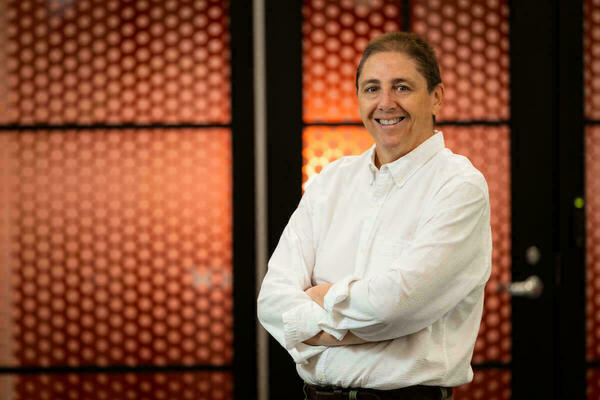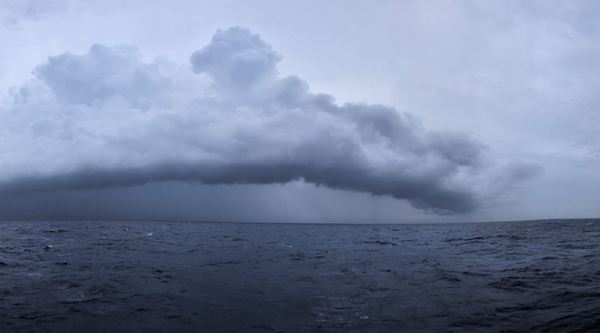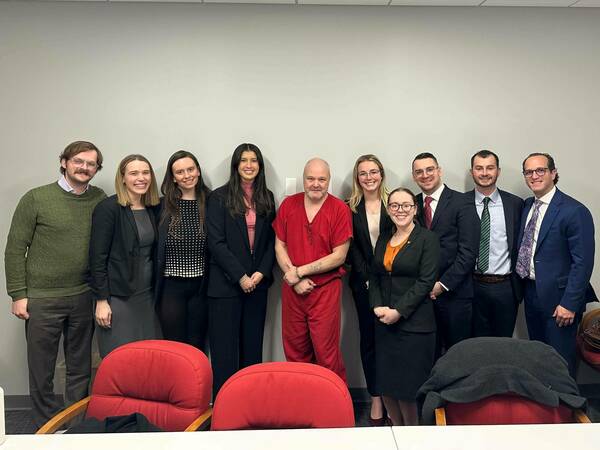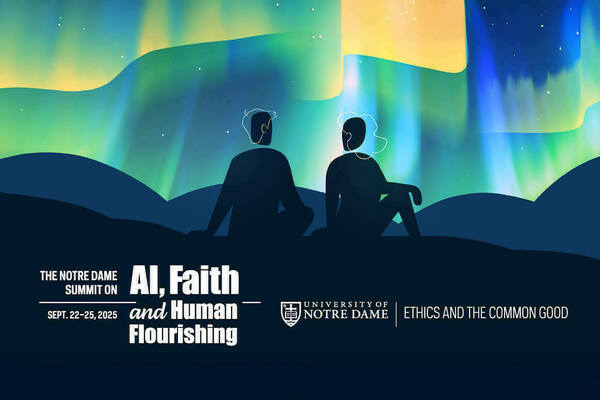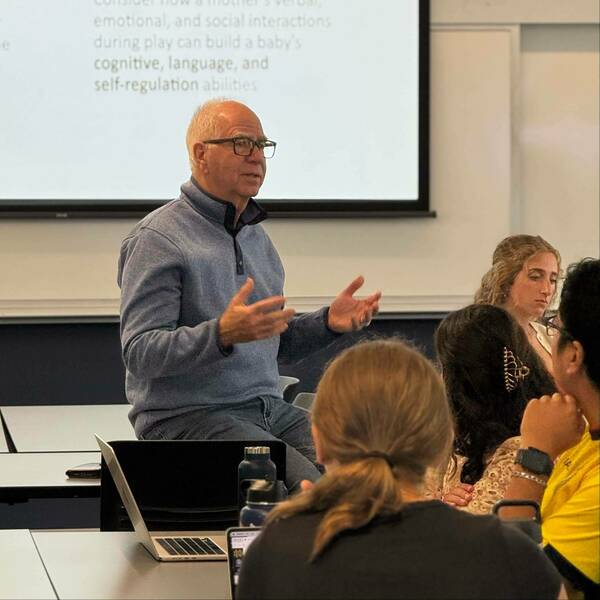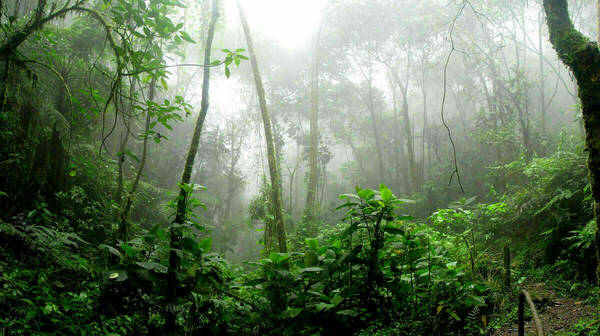Resilience amid atrocity: Journalist and master of global affairs graduate chronicles the experiences of Ukrainian people
Anna Romandash is an award-winning journalist from Lviv, Ukraine and a 2022 graduate of the Keough School of Global Affairs’ Master of Global Affairs program.
Romandash, who works as a research associate at the school’s Pulte Institute for Global Development, continues to report on Russia’s war in Ukraine and how it affects the lives of everyday people. In this conversation, she shares how her education has helped to strengthen her work covering wartime atrocities and documenting the resilience of the Ukrainian people.
Q&A with Anna Romandash
Why did you choose the Master of Global Affairs program at the Keough School?
I wanted a great education. Before I came to the Keough School, I had a chance to compare university studies in Europe and the United States during a five-year stretch where I lived in five European countries — the Czech Republic, Latvia, Spain, the United Kingdom and Ukraine.
At the time, I wanted to get back to school to learn theoretical frameworks that would strengthen my foreign affairs reporting. I was increasingly interested in topics like reconciliation and transitional justice. And I had been reporting frequently on human rights violations and the persecution of Ukrainians in Russia-occupied territories in Eastern Ukraine and Crimea since 2014.
With all this in mind, the Keough School stood out as a place where I could dive deeper into the subjects I covered. I also realized it could help me understand how international organizations and institutions could help facilitate transition in conflict-affected countries, and how they could meet humanitarian challenges and provide support for traumatized populations. And I knew it would help me better understand how individuals on the ground could facilitate reconciliation and transitional justice. This ultimately led me to pursue a master of global affairs degree with a concentration in international peace studies.
Which aspects of the Master of Global Affairs program impacted you the most?
I really like the community of my fellow students. It was impressive to meet so many bright and genuine people who wanted to make a difference in the world. I made many friends, and I’ve seen many of my classmates succeed and do great things. Looking back, I really appreciated the welcoming and diverse atmosphere. It was a place where everyone wanted me to succeed, and also, importantly, a place where there was a diversity of opinions and I could freely express my thoughts.
My instructors were also hugely helpful. I’m particularly grateful for faculty members like George A. Lopez and David Cortright. I worked with both after graduating as I explored topics related to sanctions related to Russia’s invasion of Ukraine. Their guidance and expertise was critical as I gained a deeper understanding of how governments use sanctions today — and how they affect people’s lives.
Since graduating, you’ve continued to cover the war in Ukraine, your home country, and how it affects people on the ground — particularly women. What have you learned so far from this experience, and what has been most challenging?

Photo credit: Alexey Aksenov.
I’ve never stopped working in journalism, which is something that I love doing. I wrote a book on Women of Ukraine and their resilience during the war. In it, I documented experiences of internally displaced and refugee women, women in the military, volunteers, teachers, activists, psychologists and more. All of these women were deeply affected by the invasion in different ways, and, importantly, they all remained engaged and determined to help their people.
I talked to mothers whose children were kidnapped by Russians in the occupied territories. They managed to rescue the children later on and bring them home, and those were very powerful stories. At the same time, they were difficult to grasp. Horrors like these should not be happening anywhere in the world today.
I am also carrying out investigative projects on human trafficking of Ukrainians that has resulted from Russia’s invasion of Ukraine. I find it challenging to report on the way Russia kidnaps children from occupied territories within Ukraine and then puts them for adoption, and it is also very difficult to write about human rights violations, abuses, rapes and other horrific crimes that Ukrainians have survived in occupation. But at the same time, this is important work that needs to be done.
Ultimately, I hope that as a result of my work, more people remember and support Ukraine. When I report, I want it to remind people around the world that Ukraine is in a critical situation and needs international support as Russia continues its war and its human rights violations.
What skills or knowledge from the Master of Global Affairs program do you draw upon in your work as a journalist?
My education helps me approach my work from a more nuanced perspective. I’ve learned to consider different mindsets, worldviews and backgrounds of others who may be reading my work. It has also provided me with fantastic insights into transitional justice and reconciliation, the role of truth telling, and decolonization.
Decolonization is an ongoing process in Ukraine as we reflect on our past, including the Holodomor (the Soviet-induced famine that killed millions of Ukrainians nearly a hundred years ago), the horrors of Russia’s present-day war in Ukraine and the need to embrace our history with all of its parts — both good and bad — in order to reconcile with our national identities.
Understanding all of these realities is critical to conducting good reporting that captures a holistic view of Ukrainian society.
What advice do you have for someone who is considering a master of global affairs?
Be curious, open-minded, and patient, and challenge yourself to subjects and areas that seem unfamiliar.
Also, don’t be afraid to push yourself whenever you struggle with classes or projects. Ultimately, overcoming challenges during your studies will help prepare you to overcome future hurdles beyond the classroom. So embrace the challenges you encounter and use them as a way to grow and become stronger and more resilient.
Related: Read Romandash’s writing in Notre Dame Magazine
Master of Global Affairs Program
The two-year master of global affairs degree provides rigorous professional training, close engagement with policymakers, multi-disciplinary faculty and a network of students from around the world, alongside extended fieldwork with global partners working to address global challenges.
Originally published by at keough.nd.edu on January 21, 2025.
Latest Research
- Managing director brings interdisciplinary background to Bioengineering & Life Sciences InitiativeThis story is part of a series of features highlighting the managing directors of the University's strategic initiatives. The managing directors are key (senior) staff members who work directly with the…
- Monsoon mechanics: civil engineers look for answers in the Bay of BengalOff the southwestern coast of India, a pool of unusually warm water forms, reaching 100 feet below the surface. Soon after, the air above begins to churn, triggering the summer monsoon season with its life-giving yet sometimes catastrophic rains. To better understand the link between the formation of the warm pool and the monsoon’s onset, five members of the University of Notre Dame’s Environmental Fluid Mechanics Laboratory set sail into the Bay of Bengal aboard the Thomas G. Thompson, a 274-foot vessel for oceanographic research.
- Exoneration Justice Clinic Victory: Jason Hubbell’s 1999 Murder Conviction Is VacatedThis past Friday, September 12, Bartholomew County Circuit Court Judge Kelly S. Benjamin entered an order vacating Exoneration Justice Clinic (EJC) client Jason Hubbell’s 1999 convictions for murder and criminal confinement based on the State of Indiana’s withholding of material exculpatory evidence implicating another man in the murder.
- Notre Dame to host summit on AI, faith and human flourishing, introducing new DELTA frameworkThe Institute for Ethics and the Common Good and the Notre Dame Ethics Initiative will host the Notre Dame Summit on AI, Faith and Human Flourishing on the University’s campus from Monday, Sept. 22 through Thursday, Sept. 25. This event will draw together a dynamic, ecumenical group of educators, faith leaders, technologists, journalists, policymakers and young people who believe in the enduring relevance of Christian ethical thought in a world of powerful AI.
- Preparing Global Leaders: Notre Dame Students Put Early Childhood Development Science into PracticeThis fall, Notre Dame students are turning research into real-world solutions. In a unique course, Early Childhood Development and Poverty Alleviation: A Global Perspective, 27 students are learning how the science of early childhood development can break cycles of poverty — and then applying…
- How can we have better conversations about environmental conservation? New Notre Dame research charts a path.As the planet faces mounting environmental crises, including a decline in global biodiversity, a new study from the University of Notre Dame calls for a seemingly simple yet transformative practice: better conversations. In a co-authored paper published in Conservation Biology, Daniel C. Miller outlines five key principles to foster more effective and inclusive dialogue about conservation. The paper builds on more than a decade of collaborative work in conservation social science and presents a framework to address one of the field’s most pressing yet underexamined issues—how conservationists talk to one another.








